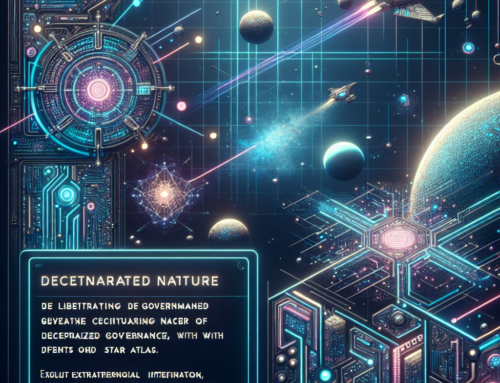Star Atlas and Carbon Taxes: A Sustainable Future

Star Atlas and Carbon Taxes: A Sustainable Future
In recent years, the conversation about sustainability and climate change has gained tremendous momentum. As industries evolve, many are beginning to explore ways to mitigate their environmental impacts. One such innovative approach is the concept of carbon taxes, which can also be applied within the realms of gaming and virtual economies, particularly in projects like Star Atlas.
What is Star Atlas?
Star Atlas is an ambitious space-themed game built on the Solana blockchain. It blends traditional gaming elements with decentralized finance (DeFi) and non-fungible tokens (NFTs), allowing players to own, trade, and monetize digital assets in a vast universe. As players wage wars, explore new worlds, and trade resources, the game offers a unique blend of immersive gaming and economic strategy. However, with this innovative gameplay comes the responsibility of addressing the environmental impacts of blockchain technology.
Understanding Carbon Taxes
A carbon tax is a financial charge imposed on companies based on their greenhouse gas emissions. The idea is simple: by charging businesses for their carbon output, it creates a financial incentive to reduce emissions and transition to greener alternatives. This approach aligns with global efforts to combat climate change by promoting more responsible practices.
Applying Carbon Taxes to Star Atlas
While Star Atlas is primarily a digital platform, the principles of carbon taxes can still apply through a few creative strategies. Here’s how:
-
In-Game Emissions Tracking: Just as companies track their carbon emissions, Star Atlas can implement a system to measure the carbon footprint of players’ activities. For instance, certain actions within the game could generate "emissions," which can then be tracked and reported.
-
Environmental Incentives: The game could introduce mechanics that reward players who engage in eco-friendly actions. For example, players could receive bonuses for participating in missions that promote sustainability within the game universe. The rewards can be based on a "green" score that reduces their carbon tax burden in the game.
-
Carbon Offset Mechanisms: Star Atlas could integrate partnerships with organizations focused on carbon offsets. Players could have the option to donate a portion of their in-game earnings to environmental projects, such as planting trees or clean energy initiatives. This way, players can actively contribute to reducing their overall carbon footprints.
-
Transparent Carbon Reporting: A visualization tool could be created within the game that showcases how player’s actions impact the game’s (and real-world) environment. Transparency in emissions will encourage players to engage in more sustainable behaviors, creating an awareness of their digital footprint.
- Community Engagement: Developing a community-focused approach to sustainability can foster collaboration among players. Star Atlas could host events or challenges centered around sustainability, allowing players to earn rewards while learning about the importance of reducing carbon footprints.
Toward a Sustainable Future
By integrating carbon tax principles into Star Atlas, the gaming industry has the opportunity to lead the way in creating a sustainable future. As players engage in this digital cosmos, they can simultaneously learn about environmental responsibility and see the tangible impacts of their choices on both virtual and real-world ecosystems.
At Titan Analytics, we are passionate about exploring the intersection of gaming and sustainability. As a Solana validator and a pioneer in Star Atlas analytics, we are committed to promoting innovations that help create a greener future for all.
To dive deeper into Star Atlas data and insights, visit us at Titan Analytics Star Atlas Modules. If you have any questions or want to connect, please reach out to us at Titan Analytics Contact. Together, let’s embark on a journey toward a sustainable universe!




